Though magical thinking is a common human phenomenon, it involves certain psychological benefits and drawbacks. It can be counterproductive and even a sign of a mental health disorder.
Understanding Magical Thinking
Some people have a significant tendency to make connections between mystical thinking and real events. They tend to have extreme faith in the existence of supernatural powers, even when it’s not rational. The human brain is designed to pick up different patterns. That’s why people look for meaning even in unrealistic situations.
Magical thinking, often known as superstitious thinking, is associated with certain beliefs related to supernatural powers. This kind of animistic thinking explains how those beliefs can manipulate unrealistic events in the physical world. It is considered to be a form of fallacious thinking. Studies [mfn] Boardman, C. R., & Sonnenberg, A. (2014). Magical thinking. Clinical and translational gastroenterology, 5(11), e63. https://doi.org/10.1038/ctg.2014.15 [/mfn] suggested that people may believe in unrealistic relations between certain events that have no scientific evidence to substantiate.
This kind of thought process can be observed in children aged 5-10 years [mfn] Simonds, L. M., Demetre, J. D., & Read, C. (2009). Relationships between magical thinking, obsessive-compulsiveness and other forms of anxiety in a sample of non-clinical children. The British journal of developmental psychology, 27(Pt 2), 457–471. https://doi.org/10.1348/026151008×345582 [/mfn] . But the superstitious beliefs can also continue into their adulthood. Most of such practices cannot cause any harmful impact on the individual. But these beliefs may lead to certain mental health disorders in rare cases. Obsessive-compulsive disorder [mfn] Einstein, D. A., & Menzies, R. G. (2004). The presence of magical thinking in obsessive compulsive disorder. Behaviour research and therapy, 42(5), 539–549. https://doi.org/10.1016/S0005-7967(03)00160-8 [/mfn] , schizophrenia [mfn] García-Montes, J. M., Pérez-Álvarez, M., Odriozola-González, P., Vallina-Fernández, O., & Perona-Garcelán, S. (2014). The role of magical thinking in hallucinations. Comparisons of clinical and non-clinical groups. Nordic journal of psychiatry, 68(8), 605–610. https://doi.org/10.3109/08039488.2014.902500 [/mfn] , and generalized anxiety disorder [mfn] West, B., & Willner, P. (2011). Magical thinking in obsessive-compulsive disorder and generalized anxiety disorder. Behavioural and cognitive psychotherapy, 39(4), 399–411. https://doi.org/10.1017/S1352465810000883 [/mfn] are some of the examples of mental health disorders associated with magical thinking.
Benefit Of Magical Thinking
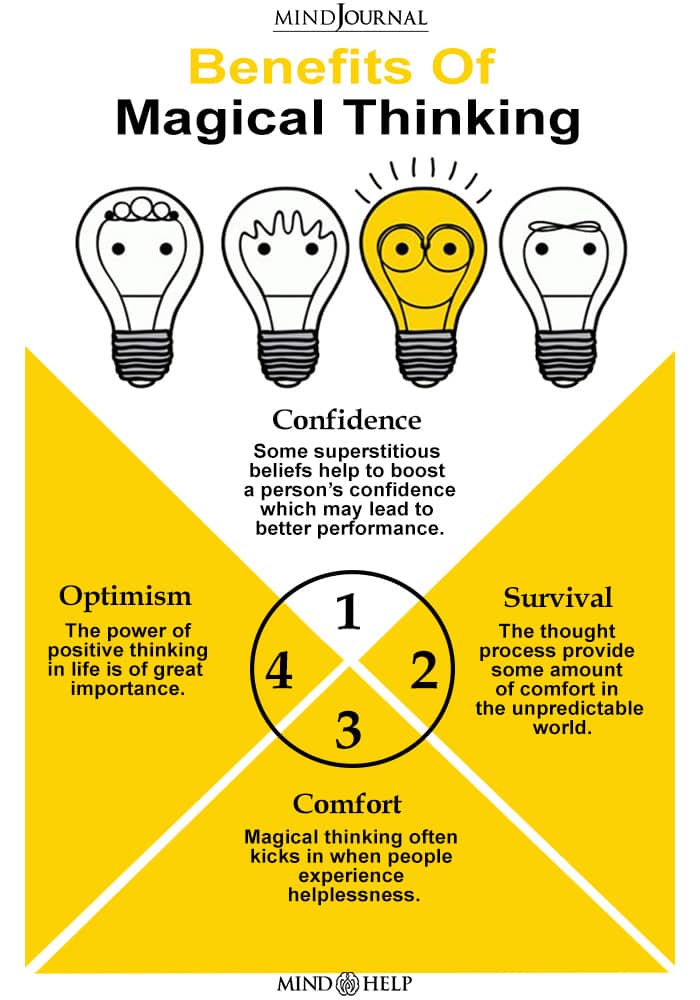
Superstitions associated with good luck are considered to be a common way that engages people in magical thinking. It depends more on the beliefs than the superstitions. Sometimes, beliefs can help one to perform better in a specific situation. This process may seem baseless to some people, but a study [mfn] Brashier, N. M., & Multhaup, K. S. (2017). Magical thinking decreases across adulthood. Psychology and aging, 32(8), 681–688. https://doi.org/10.1037/pag0000208 [/mfn] suggested that such practices positively affect the result of people’s performance. Psychologists have explained the science behind this logic as some of the superstitions may increase the self-effectiveness of a person and cause a performance improvement.
Some of the important advantages of superstitious thinking may include:
1. Confidence
Studies [mfn] Shweder, R. A., Casagrande, J. B., Fiske, D. W., Greenstone, J. D., Heelas, P., & Lancy, D. F. (1977). Likeness and likelihood in everyday thought: Magical thinking in judgments about personality [and comments and reply]. Current Anthropology, 18(4), 637-658. https://doi.org/10.1086/201974 [/mfn] have shown that this way of thinking can play a pivotal role in improving the performance of a person. Some superstitious beliefs help to boost a person’s confidence which may lead to better performance. It makes people believe that there is some existence of a superpower that will help them if they are stuck in any difficult situation. The existence of supernatural power will provide them good luck and this makes them perform without any worry. Holding a lucky charm when a result of the performance is yet to be announced, keeping the fingers crossed in a difficult situation, or wishing someone good luck with prayers are some examples of it. These practices are beneficial in increasing self-confidence in an individual.
2. Survival
When people experience helplessness about an event or situation, magical thinking appears and often kicks in. During these situations, people tend to make a wish, perform a superstitious ritual, or assign belief in the existence of a superpower outside the rational world. These practices allow them to feel that the situation is not entirely out of their control. It helps them to gain more self-confidence. It reduces the anxiety level and helps people to survive.
3. Comfort
The practice of magical thinking provides some amount of comfort to certain people. When people find things they have no control over, this thought process helps them to feel more in control. These beliefs prevent them from distress, frustration, and anxiety. If the outcome does turn out in favor of them, people start to believe in the power of superstitions. Thinking that the lucky pencil helps in acing the exam is one of the examples of such a condition.
4. Optimism
Magical thinking includes a form of positive thinking also. Researchers [mfn] Eagleson, C., Hayes, S., Mathews, A., Perman, G., & Hirsch, C. R. (2016). The power of positive thinking: Pathological worry is reduced by thought replacement in Generalized Anxiety Disorder. Behaviour research and therapy, 78, 13–18. https://doi.org/10.1016/j.brat.2015.12.017 [/mfn] suggested that the power of positive thinking in life is of great importance. Although there is no evidence that superstitious thoughts can create a positive impact on physical health, there is some evidence [mfn] Fritzsche S. D. (2012). The power of positive thinking. Plastic surgical nursing : official journal of the American Society of Plastic and Reconstructive Surgical Nurses, 32(3), 93–94. https://doi.org/10.1097/PSN.0b013e3182462666 [/mfn] on how positive thoughts can change a person’s outlook on life and reduce stress and depression. People start to notice good things around them. Increased optimism makes this process smooth. This leads to relieving emotional distress. It may not improve physical health, but it can make one feel a bit better. It improves the mindset that allows a person to take such specific steps to identify the problems the person is experiencing.
Read More About Optimism Here
Drawbacks Of Magical Thinking
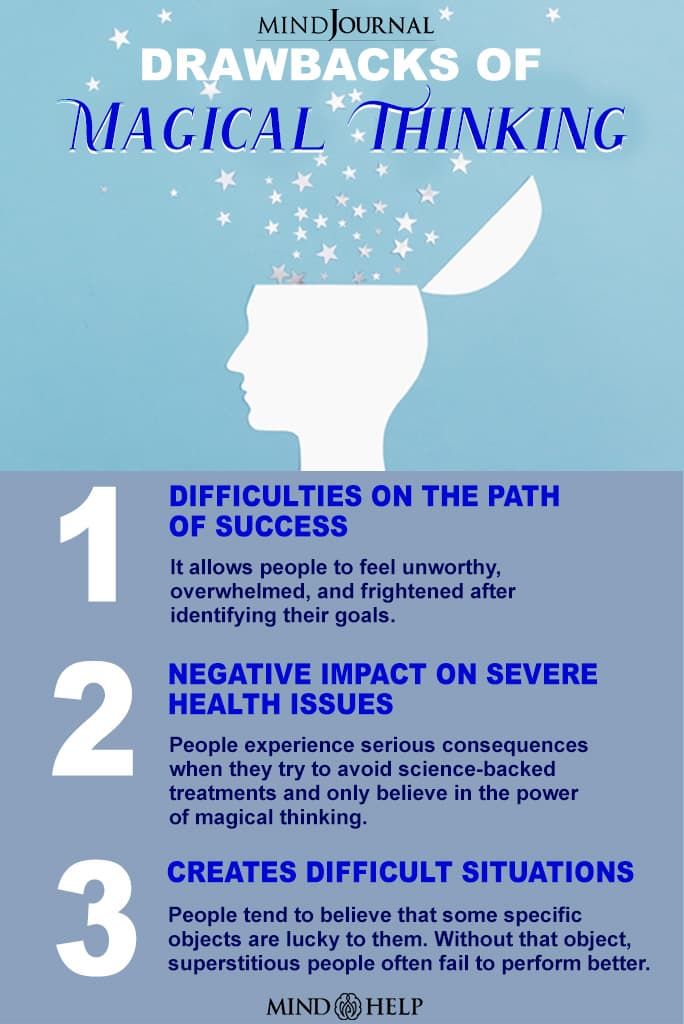
A repetitive habit of practicing superstitious beliefs and rituals can be harmful to people. Despite having a few advantages, this thought process can create negative impacts also, such as:
1. Difficulties on the path of success
The negative part [mfn] Jwa A. (2015). Early adopters of the magical thinking cap: a study on do-it-yourself (DIY) transcranial direct current stimulation (tDCS) user community. Journal of law and the biosciences, 2(2), 292–335. https://doi.org/10.1093/jlb/lsv017 [/mfn] of it allows people to feel unworthy, overwhelmed, and frightened after identifying their goals. People who suffer from this thinking disorder are more likely to put all their faith into rituals and superstitions. They make almost no effort of their own and don’t consider any other possibilities. This situation can create slackness and allows the bad habit of only thinking positively but not putting in any effort. This often leads to them facing difficulties and experiencing a hard time in achieving success.
2. Negative impact on severe health issues
When people who suffer from this thinking disorder are diagnosed with any serious health issues, they try to pursue alternative treatments and superstitious practices that have no association with their diseases. People may experience negative consequences such as worsening health issues if they try to avoid science-backed treatment or medication and only believe in the power of magical thinking.
Sometimes, the situation may worsen if the person is suffering from any severe life-threatening health problems. In those cases, most patients refuse to hinder the proper medical procedures. Walking on hot coals, laying on nails are some of the examples of superstitious practices that can have an extremely negative impact. Such dangerous practices can even cause the death of people.
3. Adversely affects performance
This thought process makes a situation tricky when the belief is about an object. Some people tend to believe that some specific objects are lucky to them. But it can have a negative effect also. Without that object, superstitious people often fail to perform better. They don’t feel capable of facing any situation without that object. It prevents them from gaining self-confidence. They become extremely dependent on that object. It also raises a kind of fear and lack of concentration in them. Those people are more likely to blame the situation rather than considering any other possible cause. Their stress sabotages their performances.
A Word Of Caution
Though magical thinking provides certain benefits to people, it is extremely essential to avoid such practices and beliefs. The best way is to not allow others to think for you and demand scientific and realistic evidence for anything that seems illogical. Another way is to avoid favoritism and biases as these often allow someone to refuse real reasons. To beat the negative impact of animistic thinking, it is important to look for valid reasons.



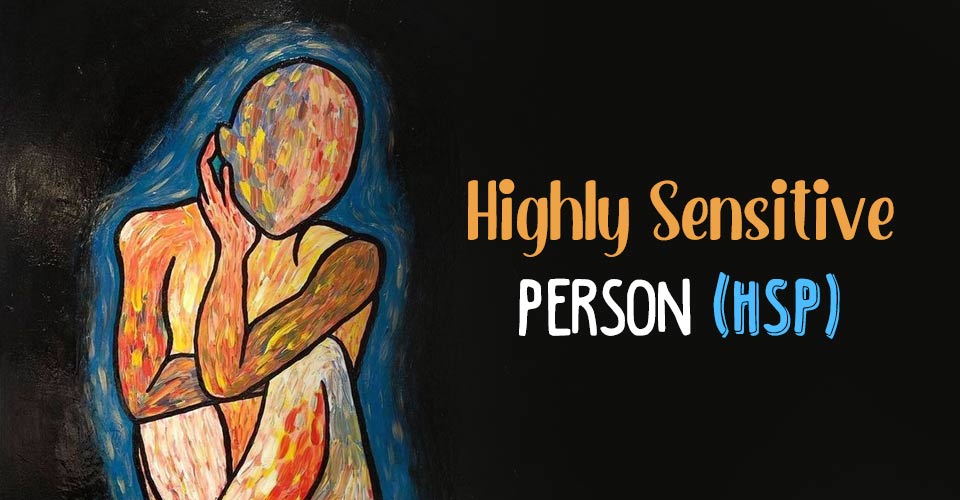

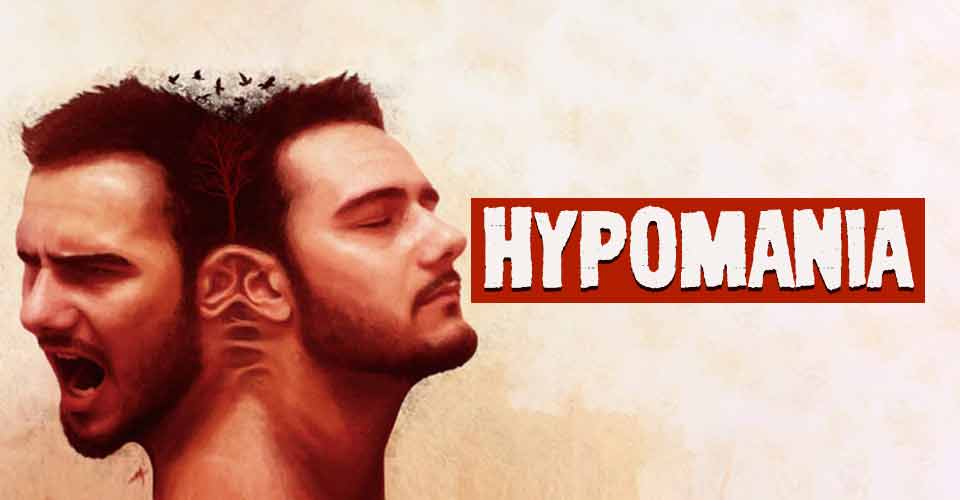



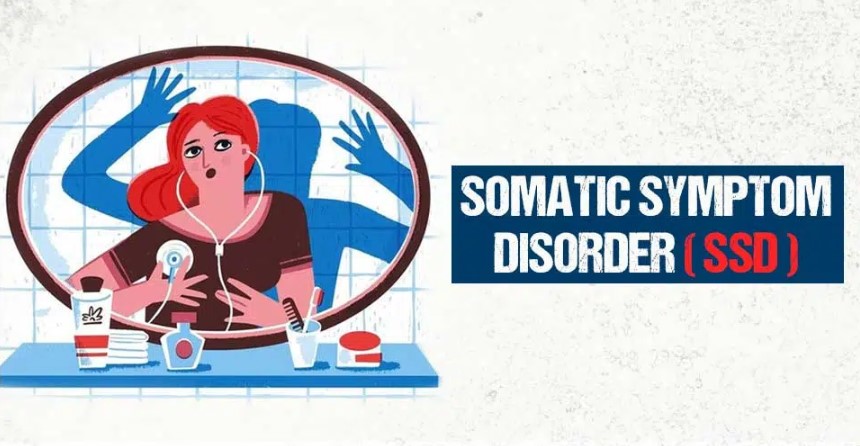

Leave a Reply